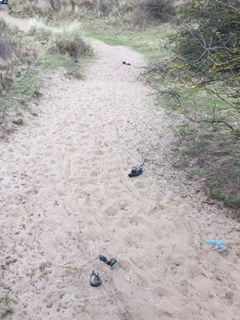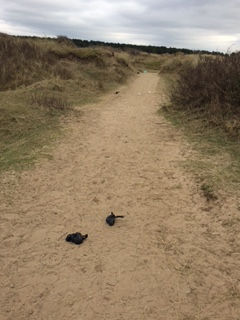Pick up your dog mess, and put it in the bin!
- Formby Bubble

- Mar 15, 2016
- 2 min read

One of our readers has just been down to the beach via the Lifeboat Road carpark and was disgusted by the quantity of dog poo bags left on the public pathway.
They said; " It looks like someone has just gone collecting dog poo bags in bushes and thrown them down the pathway"

Any responsible dog owner knows that picking up and bagging their animals mess is only part of their duty. These bags should, unquestionably, be carried along and deposited into the rubbish bins provided, not thrown into the paths and hedgerows.
Dog mess can cause blindness in our children and spread all kinds of diseases and Formby Beach is where children often visit and play. Please, please, PICK IT UP AND PUT IT IN THE BIN!!!
Here are the facts of Dog Poop..... Toxocariasis, still causes partial blindness in up to 100 children every year. Having said that, there is really no need to worry provided your son's grandparent's dog is regularly wormed. This should be carried out monthly until the dog is six months old and then regularly thereafter. Toxocariasis is an infestation of humans, usually children, with the larvae of Toxocara canis, a small threadlike worm that resides in a dog's intestine. A dog harbouring the small round worm causes large numbers of worm eggs in its faeces, which can then contaminate the soil. Children who then play with an infested dog or with soil contaminated with its faeces can then inadvertently put their fingers in their mouths and can swallow some of the worm eggs. The swallowed eggs hatch in the intestine of the child to liberate larvae, which then travel towards the liver, lungs, brain and eyes. Here they can trigger off allergic reactions such as asthma, and they also have more serious affects such as loss of vision at least partially. If you regularly worm the dog, this will not be a problem, although the mere thought of your children coming into contact with dog poo is pretty revolting anyway. Children generally run a much greater risk of coming into contact with Toxocara in public parks where there is no guarantee that the dogs which are allowed to roam free there are all wormed. Out of interest, the diagnosis of toxocariasis is made from sputum analysis and from liver biopsy, and severe cases are treated in hospital with anthelmintic drugs (anti-worm drugs) to control the infestation. http://www.nhs.uk/conditions/Toxocariasis/Pages/Introduction.aspx






.jpg)




















.jpg)


Comments